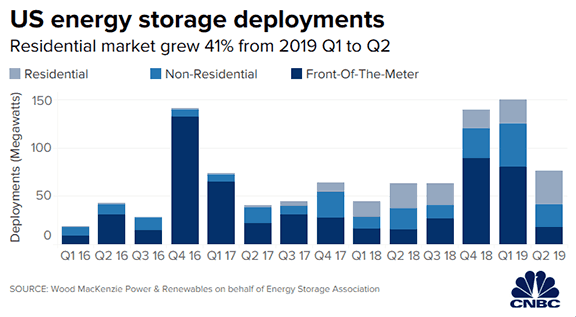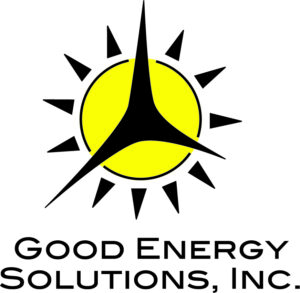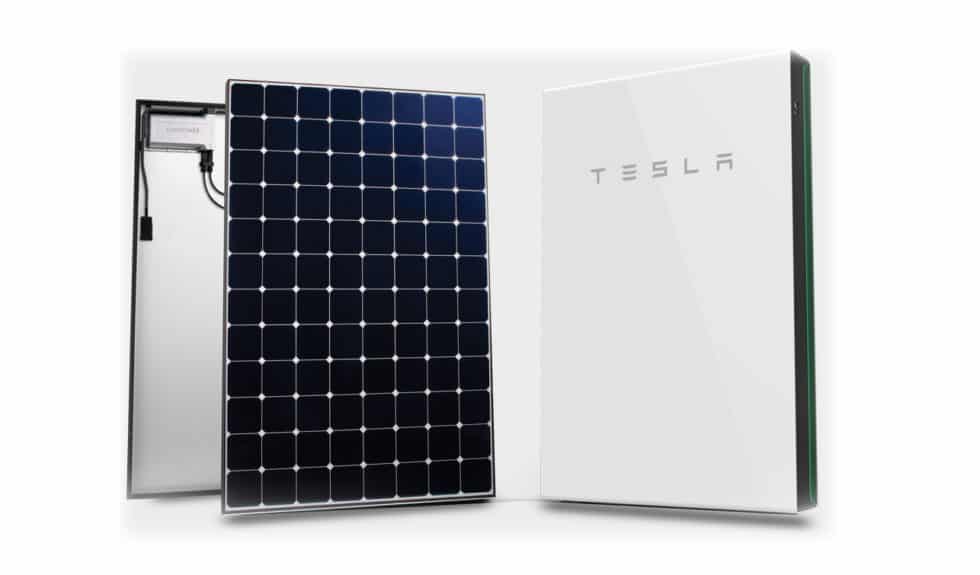UPDATE: February 2021
Home Owners are Becoming More Interested in Battery Storage. 5 Questions to Ask When Choosing a Battery for Your Home.
More frequent, intense storms have led to more power outages, which means you rely on backup power more than ever. Additionally, a correctly configured battery storage system can discharge power during peak times so you don’t pay higher rates to utilities that charge a time-of-use rate.
Be sure to choose a reliable battery that suits your specific needs. You don’t want to overpay for the capacity you don’t need or short-change yourself of the energy you do need. Understand what is needed to see a high return on your investment instead of a system that does not meet expectations.
Ask these simple questions when choosing battery storage for your solar power system.
- Is the battery safe?
There are two main battery chemistries used for energy storage applications – lithium iron phosphate (also called lithium ferro phosphate or LFP) and lithium nickel manganese cobalt (also called NMC or lithium ion).Lithium iron has excellent thermal stability vs the less stable cobalt-based lithium ion battery. Less stable batteries increase the risk of thermal runway, which can cause the battery cell to overheat, smoke, and even catch fire.
- In what environment does my energy storage system operate?
In Kansas and Missouri, extreme cold temperatures mean that batteries should be installed inside a protected area. If you want to maximize battery lifespan and system efficiency, your energy storage system should be installed in a temperature-controlled room. If place the unit in the garage, avoid charging the battery below 32 degrees Fahrenheit (0 degrees Celsius) and exposing the battery to direct sunlight.An aluminum cabinet can: reduce the impact of extreme temperatures, protect the battery from moisture/salt corrosion, deliver 5x better thermal performance.
- How frequently does my battery storage cycle each month? How much will I use the battery?
A lithium battery offers more than 3,000 cycles compared to 500-1,000 cycles for lead acid batteries. If you need more than 10 cycles per month (or 120 cycles per year) lithium can save you up to 70 percent in energy costs. A system programmed for self-supply or time-of-use cycles every day, making a lithium iron phosphate battery, which delivers 6,000 cycles, your most cost-effective option.Look at warranties. If your energy storage system cycles less than 10 times per month, lithium batteries that come with a 10-year warranty would be a better choice than Lead acid batteries, which typically offer a warranty of just two to five years.
- How much energy does my home consume each day?
If your goal is to avoid high electricity costs by having your solar storage system self-supply your entire home load, the battery bank you choose should be big enough to power your home through the night. If your utility company uses a time-of-use rate, a review of previous electric bills will show your peak usage so you can choose the right-size battery bank.For battery backup systems or off-grid application, 24-hour energy consumption of the circuits can be calculated on the backup load panel. The battery bank you select should be able to supply power for 24 hours at the very least. If you have a solar system, your solar system will be able to recharge your battery while helping power your house loads.
- What cell type is used in the battery bank and how are cells wired together?
There are three types of battery cell:- Cylindrical: Cylindrical cells can be easily grouped together to form different battery bank sizes. However, cylindrical cells are heavy and provide low power density and slow heat dissipation.
- Prismatic: Prismatic cells have the lowest material degradation rate and a large capacity, which means you’ll need far fewer cells to form a 48-volt battery bank.
- Porch: Porch cells are ideal for consumer products, such as phones, because of their lighter weight and higher power density. Unfortunately, porch cells are difficult to wire together and deliver the poorest thermal stability.
Need answers to more questions? Contact us for a free consultation to see if you can benefit from a battery energy system. Our knowledgeable experts can help you prepare to be able to keep working and learning from home even when the grid is down.
UPDATE: January 2020
The evolution of battery technology has continued to move forward and this decade should show progress in electric vehicle affordability and homeowners being able to store their solar energy overnight.
At Good Energy Solutions, we have seen an increase in interest in our product offering of the Tesla PowerWall. Homeowners are able to store their solar energy to use when the grid goes down, or to save money on their energy bill via demand charge management. We are seeing an increase of homeowners including the batteries in their home energy systems and we expect this trend to continue as utilities across the country introduce rate structures that promote the use of batteries.
Good Energy Solutions is on the cutting edge as energy storage technology improves and we are excited to be a part of the changing way our world is powered. Contact Good Energy Solutions for a free consultation to see if battery-storage is right for you.
Utility-scale battery storage is on the rise. In recent news, an electric cooperative in Alaska purchased a 93MWh battery from Tesla and will likely begin operation in the Fall of 2021. “The battery will improve grid stability, electric power reliability, and system efficiency. It will reduce power outages and use of greenhouse gases while creating more opportunities to implement renewable energy projects”
The Alaskan utility battery is not the first of its kind. Utilities in California, Hawaii, Australia, and American Samoa have all used Tesla batteries. The Australian project features a 129MWh system which was the model for Tesla’s Utility-Scale Energy Storage Product released in the summer of 2019 called the Megapack.
An interesting article written by Pippa Stevens, published Dec. 30, 2019 speaks to The battery decade: How energy storage could revolutionize industries in the next 10 years. It includes information, including a video that talks about the evolution of batteries, their invention, different battery technologies, their history, and their future. “While the exact type of battery that will win out is unknown, what’s certain is that batteries will play an even larger role in powering our lives going forward” See Article.

UPDATE: August 2018
We are seeing an explosion of battery technology over the last year or two as well as expansion of use. Batteries are no longer solely used for going “off the grid” or for Electrical Vehicles (EVs) but are also used in conjunction with demand management technologies to help reduce power consumption during peak hours and integrated into Smart Home Systems. Installing a battery system can help mitigate utility charges and can also provide your home with backup power should you experience an outage. And the timing is right as we are seeing more power outages due to extreme weather, fires, and unreliable grids.
Integrating home energy management with home automation allows for energy savings by responding to weather events, by intelligently balancing and conserving energy when the power goes out or enabling the homeowner to shut off the thermostat remotely while out of town. Read more about the new Sonnen EcoLinx. Good Energy Solutions is a Sonnen Batterie certified partner and is excited about the future of energy and the possibilities of shared power.
As the demand for Electrical Vehicles increase and the renewable energy industry continues to find more applications for batteries, scientists and developers continue to race against each other to find abundant substances to cut the costs of battery manufacturing. As we see batteries incorporated more into everyday life it is imperative to use not only cost effective but safe materials.
(Original Post: May 1, 2015) Battery cost and battery storage capacity are two parts of the equation that potential owners of solar and wind power systems must consider when deciding whether to operate “off the grid” or “grid tied.”
In the past, the cost of batteries has usually steered wide-eyed hopeful owners back in the direction of grid-tied. Fortunately, just as technology improvements have made solar panels more efficient and less costly, the same is true for battery storage. And those wide-eyed hopefuls may be able to afford exactly what they are looking for.
Just yesterday, Tesla just unveiled it’s new “Powerwall“. A home battery that stores 10kWh’s for $3,500. The device hangs discretely from a wall and allows consumers to store solar energy that may be used as a back-up system for grid-tied customers or for customers who want to live completely off the grid.
Competition between battery companies continues to drive prices down while simultaneously expanding battery storage capacity. An interesting article written by Zachary Shahan investigates the numerous companies participating in the battery storage market race. See Article
Batteries not only give home-owners the choice of living off the grid but they also help commercial businesses save money. Storing energy on batteries can lower or eliminate electrical utility high peak demand charges. Read more…
It’s an exciting time in the energy world, and definitely a time of change. As traditional energy prices continue to climb, independent energy pioneers now have accessibility to affordable renewable energy systems that are capable of meeting their needs day and night. Plus, the technology of battery storage is only getting better, fast.
Here at Good Energy Solutions, we have been installing stand alone and battery backup systems for over 5 years, and the promise of the future with the technology has never been greater. Inexpensive, dependable battery technology is the holy grail for making future distributed renewable energy a viable alternative to the centralized power plant model of yesterday. We keep up with the technology and provide our clients with the best solutions available.
 Our mission at Good Energy Solutions is to provide our customers with honest, real solutions to reduce their fossil fuel consumption and lower their long term energy costs. “Energy with Integrity” isn’t just a company slogan, it’s how we do business.
Our mission at Good Energy Solutions is to provide our customers with honest, real solutions to reduce their fossil fuel consumption and lower their long term energy costs. “Energy with Integrity” isn’t just a company slogan, it’s how we do business.
Founded in 2007 by Kevin and Shana Good, Good Energy Solutions has earned a reputation for our expert reliable service, long workmanship warranties, and quality commercial and residential solar installations.
If you would like to know more about solar power for your home or business, contact us here.

